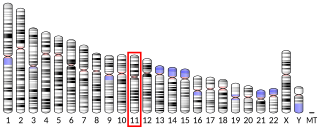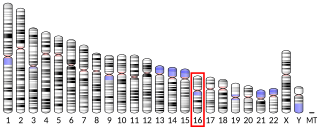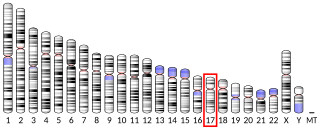
Xylosyltransferase are transferase enzymes which act upon xylose and are classified under EC 2.4.2. [1] [2]
More specifically, they can refer to:

Xylosyltransferase are transferase enzymes which act upon xylose and are classified under EC 2.4.2. [1] [2]
More specifically, they can refer to:
A congenital disorder of glycosylation is one of several rare inborn errors of metabolism in which glycosylation of a variety of tissue proteins and/or lipids is deficient or defective. Congenital disorders of glycosylation are sometimes known as CDG syndromes. They often cause serious, sometimes fatal, malfunction of several different organ systems in affected infants. The most common sub-type is PMM2-CDG where the genetic defect leads to the loss of phosphomannomutase 2 (PMM2), the enzyme responsible for the conversion of mannose-6-phosphate into mannose-1-phosphate.

A transferase is any one of a class of enzymes that catalyse the transfer of specific functional groups from one molecule to another. They are involved in hundreds of different biochemical pathways throughout biology, and are integral to some of life's most important processes.

Glycosaminoglycans (GAGs) or mucopolysaccharides are long, linear polysaccharides consisting of repeating disaccharide units. The repeating two-sugar unit consists of a uronic sugar and an amino sugar, except in the case of the sulfated glycosaminoglycan keratan, where, in place of the uronic sugar there is a galactose unit. GAGs are found in vertebrates, invertebrates and bacteria. Because GAGs are highly polar molecules and attract water; the body uses them as lubricants or shock absorbers.

Uridine diphosphate N-acetylglucosamine or UDP-GlcNAc is a nucleotide sugar and a coenzyme in metabolism. It is used by glycosyltransferases to transfer N-acetylglucosamine residues to substrates. D-Glucosamine is made naturally in the form of glucosamine-6-phosphate, and is the biochemical precursor of all nitrogen-containing sugars. To be specific, glucosamine-6-phosphate is synthesized from fructose 6-phosphate and glutamine as the first step of the hexosamine biosynthesis pathway. The end-product of this pathway is UDP-GlcNAc, which is then used for making glycosaminoglycans, proteoglycans, and glycolipids.
In enzymology, a dolichyl-phosphate beta-D-mannosyltransferase is an enzyme that catalyzes the chemical reaction
In enzymology, a dolichyl-phosphate D-xylosyltransferase is an enzyme that catalyzes the chemical reaction
In enzymology, a dolichyl-phosphate-mannose-protein mannosyltransferase is an enzyme that catalyzes the chemical reaction
In enzymology, a dolichyl-xylosyl-phosphate-protein xylosyltransferase is an enzyme that catalyzes the chemical reaction

In enzymology, a galactosylgalactosylxylosylprotein 3-beta-glucuronosyltransferase is an enzyme that catalyzes the chemical reaction
In enzymology, a xylosylprotein 4-beta-galactosyltransferase is an enzyme that catalyzes the chemical reaction
In enzymology, an UDP-N-acetylglucosamine—dolichyl-phosphate N-acetylglucosaminephosphotransferase is an enzyme that catalyzes the chemical reaction
In enzymology, a protein xylosyltransferase is an enzyme that catalyzes the chemical reaction in which a beta-D-xylosyl residue is transferred from UDP-D-xylose to the sidechain oxygen atom of a serine residue in a protein.

UDP-N-acetylglucosamine—dolichyl-phosphate N-acetylglucosaminephosphotransferase is an enzyme that in humans is encoded by the DPAGT1 gene.

Xylosyltransferase 1 is an enzyme that in humans is encoded by the XYLT1 gene.

Beta-1,4-galactosyltransferase 7 also known as galactosyltransferase I is an enzyme that in humans is encoded by the B4GALT7 gene. Galactosyltransferase I catalyzes the synthesis of the glycosaminoglycan-protein linkage in proteoglycans. Proteoglycans in turn are structural components of the extracellular matrix that is found between cells in connective tissues.

Xylosyltransferase 2 is an enzyme that in humans is encoded by the XYLT2 gene.
Dolichyl, related to Dolichol, is used in the names of:
Glucuronosyl-N-acetylgalactosaminyl-proteoglycan 4-beta-N-acetylgalactosaminyltransferase is an enzyme with systematic name UDP-N-acetyl-D-galactosamine:beta-D-glucuronosyl-(1->3)-N-acetyl-beta-D-galactosaminyl-proteoglycan 4-beta-N-acetylgalactosaminyltransferase. This enzyme catalyses the following chemical reaction
Dolichyl-P-Man:Man5GlcNAc2-PP-dolichol alpha-1,3-mannosyltransferase is an enzyme with systematic name dolichyl beta-D-mannosyl phosphate:D-Man-alpha-(1->2)-D-Man-alpha-(1->2)-D-Man-alpha-(1->3)-(D-Man-alpha- )-D-Man-beta-(1->4)-D-GlcNAc-beta-(1->4)-D-GlcNAc-diphosphodolichol alpha-1,3-mannosyltransferase. This enzyme catalyses the following chemical reaction
Xylogalacturonan beta-1,3-xylosyltransferase is an enzyme with systematic name UDP-D-xylose:xylogalacturonan 3-beta-D-xylosyltransferase. This enzyme catalyses the following chemical reaction
xylosyl transferase is the first enzyme involved in the biosynthesis of glycosaminoglycan chains, an important constituent of proteoglycans. There are two types of xylosyl transferases type I and type II.